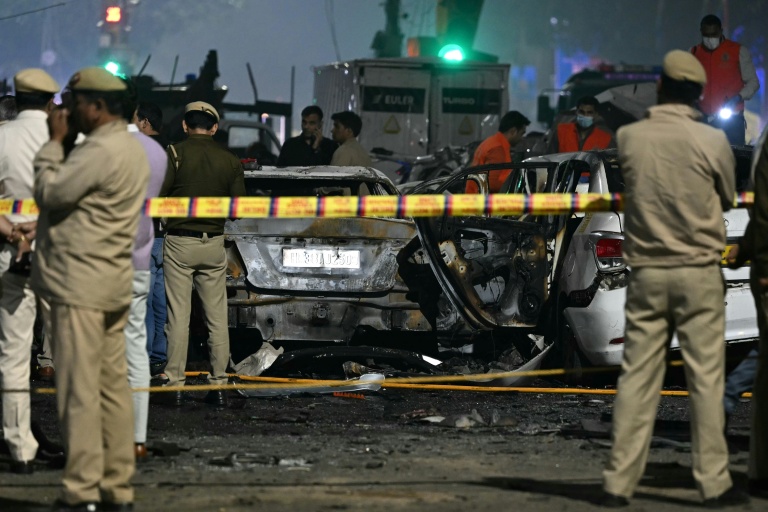World
India Vows Justice After Deadly Car Blast Claims 12 Lives

A car explosion in New Delhi on November 10, 2023, has resulted in at least 12 fatalities and left over 30 people injured, triggering a national outcry for justice. The blast, described by authorities as the most severe incident in the capital in over a decade, has raised urgent security concerns and prompted an investigation led by India’s National Investigation Agency (NIA).
The explosion occurred near a bustling metro station adjacent to the historic Red Fort, a site of significant national importance where the Prime Minister delivers the annual Independence Day address. In response to the attack, Prime Minister Narendra Modi labeled it a “conspiracy” and condemned the act as a “heinous terror incident” carried out by “anti-national forces.”
Authorities have not released comprehensive details regarding the incident. Essential information, such as the identity of individuals involved in the vehicle and the type of explosives used, remains uncertain. Additionally, officials have not confirmed whether the blast site was the intended target or if the attack was orchestrated by a domestic group or had foreign connections.
In a concerning turn of events, the explosion coincided with police arrests earlier that day, where officials seized explosive materials and firearms. Those apprehended were reportedly linked to Jaish-e-Mohammed (JeM), a group based in Pakistan with ties to Al-Qaeda, as well as Ansar Ghazwat-ul-Hind, a Kashmir offshoot associated with JeM. The Jammu and Kashmir police characterized the arrested individuals as part of a “white collar terror” group, comprising “radicalized professionals and students” allegedly operating under the guidance of foreign handlers. Despite these developments, no direct connection between the prior arrests and the Delhi explosion has been established.
India’s Response to the Attack
In the wake of the blast, the NIA has intensified its investigative efforts, conducting extensive raids in various locations, including the disputed region of Kashmir. Authorities have targeted the banned Islamist political party Jamaat-e-Islami (JeI), although there has been no confirmation linking this operation to the recent explosion. The Kashmir region has remained a contentious territory since the partition of India and Pakistan in 1947, and tensions between the two nations continue to simmer.
Additionally, police have arrested several individuals, including doctors affiliated with Al-Falah University in Faridabad, located near the capital. Yet, as with previous arrests, officials have not disclosed any connection between these detainees and the bombing.
Political Considerations and Future Implications
The cautious approach adopted by the Indian government may stem from lessons learned during past incidents. Home Minister Amit Shah indicated that the administration is awaiting results from a “swift and thorough inquiry.” Following a deadly attack in Kashmir earlier this year, the government quickly attributed the assault to cross-border terrorism from Pakistan, a claim that Islamabad has vehemently denied.
In response to that April attack, India conducted military operations inside Pakistan, resulting in significant casualties and escalating tensions. Given this historical context, public expectations for a strong reaction to the recent blast are considerable, placing additional pressure on security agencies to deliver a thorough investigation.
Furthermore, diplomatic considerations may influence India’s response. The country is currently negotiating a significant trade deal with the United States, its largest trading partner. This comes in the wake of President Donald Trump’s imposition of steep tariffs on Indian goods. Trump’s administration has publicly taken credit for facilitating dialogue between India and Pakistan, complicating the diplomatic landscape as New Delhi navigates its response to the explosion.
As the investigation unfolds, the Indian government faces the dual challenge of addressing public safety concerns while managing international relations. The coming days will be crucial in determining the direction of this inquiry and the broader implications for national security.
-

 Science3 months ago
Science3 months agoToyoake City Proposes Daily Two-Hour Smartphone Use Limit
-

 Top Stories3 months ago
Top Stories3 months agoPedestrian Fatally Injured in Esquimalt Collision on August 14
-

 Health3 months ago
Health3 months agoB.C. Review Reveals Urgent Need for Rare-Disease Drug Reforms
-

 Technology3 months ago
Technology3 months agoDark Adventure Game “Bye Sweet Carole” Set for October Release
-

 World3 months ago
World3 months agoJimmy Lai’s Defense Challenges Charges Under National Security Law
-

 Lifestyle3 months ago
Lifestyle3 months agoVictoria’s Pop-Up Shop Shines Light on B.C.’s Wolf Cull
-

 Technology3 months ago
Technology3 months agoKonami Revives Iconic Metal Gear Solid Delta Ahead of Release
-

 Technology3 months ago
Technology3 months agoApple Expands Self-Service Repair Program to Canada
-

 Technology3 months ago
Technology3 months agoSnapmaker U1 Color 3D Printer Redefines Speed and Sustainability
-

 Technology3 months ago
Technology3 months agoAION Folding Knife: Redefining EDC Design with Premium Materials
-

 Business3 months ago
Business3 months agoGordon Murray Automotive Unveils S1 LM and Le Mans GTR at Monterey
-

 Technology3 months ago
Technology3 months agoSolve Today’s Wordle Challenge: Hints and Answer for August 19









